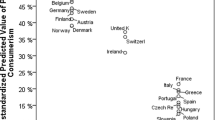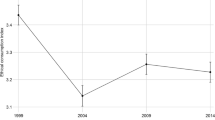Abstract
An active ethically conscious consumer has been acclaimed as the new hero and hope for an ethically improved capitalism. Through consumers’ “voting” at the checkout, corporations are supposed to be held accountable for their conduct. In the literature on political consumerism, this has mainly been approached as political participation and governance. In this article, we do a critical review of this literature. We do so by questioning the existence of what we call a “generic active consumer model.” At the core of this position, there is a belief that the active consumer is a universal entity, available across nations and time. Instead we call for an approach that takes accord of the ways consumers and consumer roles are framed in interactive processes in markets, governance structures, and everyday life. Consumers in different countries assess their responsibilities and their powers as consumers differently due to different institutionalizations within distinctive contexts. We also must take into account how the inertia of ordinary consumption and the moral complexities of everyday life restrict the adoption of an active consumerist role. Hence, the debate on political consumerism should make for a more realistic notion of ethical consumer-sovereignty and its role in improving the workings of capitalism. In our view, these findings have severe implications for understanding both theories of political consumption and the dynamics of political consumption per se.
Similar content being viewed by others
References
Akerlof G. A. (1970). The Market for ‹Lemons’: Quality Uncertainty and the Market Mechanism. Quarterly Journal of Economics 84(3):488–500
Beck U. (1997). The Reinvention of Politics: Rethinking Modernity in the Global Social Order. Cambridge: Polity Press
Braithwaith J.. (1997). On Speaking Softly and Carrying Big Sticks: Neglected Dimensions of a Republican Separation of Powers. University of Toronto Law Journal 47: 305–361
Brewer J., F. Trentmann (eds.) (2006). Consuming Cultures, Global perspectives. Historical Trajectories, Transnational Exchanges. Oxford: Berg
Coff C. (2006). The Taste for Ethics. An Ethic of Food Consumption. Dordrecht, The Netherlands: Springer
D’Angelo P. (2002). News Framing as a Multi-paradigmatic Research Program: A Response to Entman. Journal of Communication 52(4):870–888
Dobson, P. W. (2003), Buyer Power in Food Retailing: The European Experience. OECD’s Conference on Changing Dimensions of the Food Economy: Exploring the Policy Issues, 6–7 February 2003, den Haag, The Netherlands.
Dulsrud, A. and J. R. Beckstrøm (2005), The Battle for Shelf Space: Joint Marketing in the Form of Slotting Allowances. Paper presented at EAERCD conference at School of Economics and Management, Lund University, June 29–July 1, 2005.
Elster J. (1989). Nuts and Bolts for the Social Sciences. Cambridge UK: Cambridge University Press
Entman R. M. (1993). Framing: Toward Clarification of a Fractured Paradigm. Journal of Communication 43(4):51–58
EU (2001), “Promoting a European Framework for Corporate Social Responsibility.” Green Paper. European Commission: Employment & Social affairs.
Exxon (2005), Corporate Citizenship Report 2005.http://www2.exxonmobil.com/Corporate/Citizenship/CCR5/index.asp
Follesdal A. (2004). Introduction In: M. Micheletti, A. Follestdal, D. Stolle (eds.), Politics, Products and Markets. Exploring Political Consumerism Past and Present. New Brunswick and London: Transaction Publishers
Fukuyama, F. (2005), State-Building: Governance and World Order in the 21st Century (Hardcover), Cornell University Press.
Goffman E. (1974). Frame Analysis: An Essay on the Organization of Experience. New York, NY etc: Harper & Row
Gronow J., A. Warde (eds.) (2001). Ordinary Consumption. London: Routledgge
Halkier B. (2004). Handeling Food-related Risks: Political Agency and Governmentality. In: M. Lien, B. Nerlich (eds.), The Politics of Food. Oxford: Berg
Harrison R., T. Newholm, D. Shaw (eds.) (2005). The Ethical Consumer. London: Sage Publications
Holm L., H. Kildevang (1996). Consumers’ View of Food Quality: A Qualitative Interview Study. Appetite 27:1–14
Jha V. (ed.) (2006). Environmental Regulation and Food Safety. Cheltenham Glos: Edward Elgar Publishers
Jordana J., D. Levi-Faur (2004). The Politics of Regulation in the Age of Governance. In: J. Jordana, D. Levi-Faur (eds.), The politics of regulation. Institutions and Regulatory Reforms for the Age of Governance. Cheltenhan UK: Edward Elgar
Kjaernes, U., M. Miele, and J. Roex (eds.) (2007a), Attitudes of Consumers, Retailers and Producers to Farm Animal Welfare. Welfare Quality Reports No. 2, Cardiff: University of Cardiff.
Kjaernes U., M. Harvey, A. Warde (2007b). Trust in Food. A Comparative and Institutional Analysis. New York: Palgrave Macmillan
Klein N. (2000). No Logo. Knopf Canada: Picador
Kotler P., N. Lee (2005). Corporate Social Responsibility: Doing The Most Good For Your Company And Your Cause. Hoboken, NJ: John Wiley & Sons Inc
Lang, T. and M. Heasman (2004), Food Wars. The Global Battle for Mouths, Minds and Markets, Earthscan.
Majone G. (1994). The Rise of the Regulatory State in Europe. West European Politics 17:77–101
Marsden T., A. Flynn, M. Harrison (2000). Consuming Interests. The Social Provision of Foods. London: UCL Press
Merlucci A. (1988). Social Movements and the Democratization of Everyday life. In: Keane J. (ed.), Civil Society and the State: New European Perspective. London: Verso
Micheletti M. (2003). Political Virtue and Shopping. Individuals, Consumerism and Collective Action. New York: Palgrave Macmillan
Micheletti M., A. Follesdal, D. Stolle (2004). Politics, Products and Markets: Exploring Political Consumerism Past and Present. London: Transaction Publishers
Miller D. (1998). Theory of Shopping. Oxford: Polity Press
Miller D. (2001). The Dialectics of Shopping. Lewis Henry Morgan Lecture Series. Chicago: University of Chicago Press
Nordic Council of Ministers (2004),Political Consumerism: Its Motivations, Power, and Conditions in the Nordic Countries and Elsewhere, Nordic Council of Ministers.
Sassatelli R. (2006). Virtue, Responsibility and Consumer Choice: Framing Critical Consumerism. In: J. Brewer, F. Trentmann (eds.), Consuming Cultures, Global Perspectives: Historical Trajectories, Transnational Exchanges, Oxford: Berg
Simmonds P. (1995). Green Consumerism. Blurring the Boundaries Between Public and Private, In: S. Edgell, S. Wallclate, G. Williams (eds.), Debating the Future of the Public Sphere: Transforming the Public and Private Domains in Free Market Societies. Adlershote: Avenbury, 147–161
Sørensen M. P. (2004). Den politiske forbruker. København: Hans Reitzels forlag
Sustainable Consumption Roundtable (2006), I Will If You Will—Towards Sustainable Consumption. SDC Reports & Papers, UK.
Swann G. M. P. (2002): There’s More to the Economics of Consumption than (Almost) Unconstrained Utility Maximisation In: McMeekin A., Tomlinson M., Green K., Walsh V. (eds.) Innovation by Demand. New Dynamics of Innovation and Competition, Manchester: Manchester University Press
Terragni, L. and U. Kjaernes (2005), “Ethical Consumption in Norway. Why is it So Low?” I TemaNord, 517, pp. 471–485.
Trentmann F. (eds.) (2006a). The Making of the Consumer, Knowledge, Power and Identity in the Modern World, Oxford: Berg
Trentmann F. (2006b). “The Modern Genealogy of the Consumer. Meanings, Identities and Political Synapses”, In: J. Brewer,F. Trentmann (eds.), Consuming Cultures, Global Perspectives. Historical Trajectories, Transnational Exchanges. Oxford: Berg
Trentman, F. and V. Taylor (2006), “From Users to Consumers: Water Politics in Nineteenth-Century London,” in F. Trentmann (ed.), The Making of the Consumer: Knowledge, Power and Identity in the Modern World, Oxford: Berg.
Unilever (2005), Unilever Environmental and Social Report. http://www.unilever.com/ourvalues/
Vogel D. (2005). The Market for Virtue. The Potential and limits of Corporate Social Responsibility. Washington DC: Brookings Institution Press
Author information
Authors and Affiliations
Corresponding author
Rights and permissions
About this article
Cite this article
Jacobsen, E., Dulsrud, A. Will Consumers Save The World? The Framing of Political Consumerism. J Agric Environ Ethics 20, 469–482 (2007). https://doi.org/10.1007/s10806-007-9043-z
Accepted:
Published:
Issue Date:
DOI: https://doi.org/10.1007/s10806-007-9043-z




